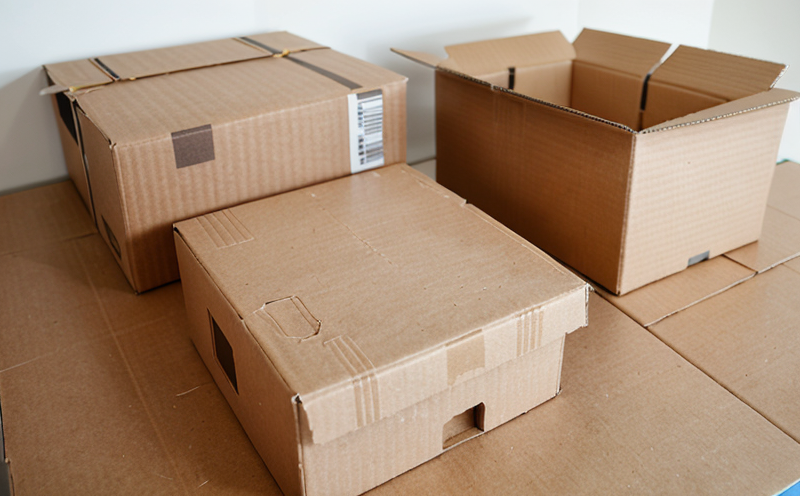TAPPI T 402-1 Basis Weight Validation
The TAPPI T 402 method is a standardized procedure used in the paper and cardboard packaging sector to validate basis weight. This test is crucial for ensuring that the material specifications meet the required standards, which are essential for quality control and compliance.
Basis weight validation ensures that the paper or cardboard being produced adheres to specified industry standards. It is a critical step in maintaining consistency across production batches, which impacts not only the reliability of the end product but also consumer trust. The test involves determining the mass per unit area of the sample material, typically using a calibrated gravimetric method.
The TAPPI standard provides detailed guidelines on how to prepare specimens for testing and the precision required in measurements. Specimens are usually cut from the main production roll or sheet into smaller samples that can be accurately weighed after drying. The drying process is critical, as moisture content directly affects the accuracy of basis weight measurement.
The equipment used for TAPPI T 402 includes a precision balance capable of measuring small masses with high precision and a cutter suitable for producing uniform specimens. The test involves weighing multiple samples dried to constant mass and averaging these weights to determine the basis weight.
Accurate basis weight validation is important not only for internal quality control but also for external compliance, especially in regulated industries like food packaging or pharmaceuticals. Non-compliance can lead to product recalls, legal action, and loss of market share. By adhering to TAPPI standards, companies ensure that their products meet the necessary safety and performance criteria.
The results of this test are used by quality managers and compliance officers to make informed decisions about production processes. R&D engineers can use these findings to refine materials and manufacturing techniques, while procurement teams rely on accurate basis weight data when sourcing materials from suppliers.
Benefits
The benefits of TAPPI T 402-1 Basis Weight Validation extend beyond mere compliance with industry standards. Accurate and consistent basis weight measurement enhances the overall quality of the final product, leading to improved customer satisfaction.
Consistency in paper or cardboard properties ensures that packaging performs as expected under various environmental conditions, such as temperature and humidity. This is particularly important for products that are subject to extreme conditions during storage or transport.
From a business perspective, accurate basis weight validation reduces waste by ensuring that the correct amount of material is used in production. This not only lowers costs but also contributes to more sustainable practices, which are increasingly valued by consumers and regulatory bodies alike.
The test also provides valuable data for ongoing process improvement initiatives. By identifying variations in basis weight early in the production cycle, companies can implement corrective actions promptly, minimizing the impact on downstream processes or end products.
Quality and Reliability Assurance
The TAPPI T 402 method is part of a broader quality assurance framework that ensures consistency in paper and cardboard packaging production. This includes adherence to ISO standards, which provide a set of international guidelines for quality management systems.
By validating basis weight according to TAPPI T 402, manufacturers ensure that their products meet the required specifications as per these global standards. This is essential not only for domestic markets but also for exports where compliance with local and international regulations is mandatory.
The reliability of the final product is directly linked to the accuracy of basis weight validation. Variations in this parameter can lead to inconsistencies in packaging performance, which may result in defects or failures during use. By maintaining precise control over this critical measurement, companies can enhance the overall reliability and safety of their products.
Reliability assurance also extends to customer trust. When customers know that the product they receive meets strict quality standards, they are more likely to be satisfied with the purchase. This positive feedback loop can lead to increased customer loyalty and repeat business.
Customer Impact and Satisfaction
The impact of accurate basis weight validation on customers is significant. Customers benefit from products that are consistently high in quality, reliable, and safe for use. This consistency ensures that the packaging performs as expected under various conditions.
In industries like food and pharmaceuticals, where product integrity is paramount, consistent basis weight is crucial to prevent contamination or degradation of contents. For consumers, this translates into safer products and a better overall experience.
From an environmental perspective, accurate basis weight ensures that the packaging uses materials efficiently without compromising on performance. This not only reduces waste but also aligns with growing consumer expectations for sustainable practices.
The satisfaction of customers is further enhanced when they can trust that the product meets all necessary regulatory requirements. This builds a positive reputation for the brand and fosters long-term relationships with loyal customers.





